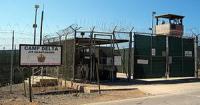-
DHS’ assertion of broad authority to search travelers’ phones, laptops challenged
The Electronic Frontier Foundation (EFF) and the ACLU the other day asked a federal court to rule without trial that the Department of Homeland Security violates the First and Fourth Amendments by searching travelers’ smartphones and laptops at airports and other U.S. ports of entry without a warrant.
-
-
What helps, or prevents, U.S. military interventions from achieving their goals?
Using an original data set of 145 ground, air, and naval interventions from 1898 through 2016, a new report identifies those factors that have made U.S. military interventions more or less successful at achieving their political objectives. The United States has successfully achieved its political objectives in about 63 percent of the interventions, but the levels of success have been declining over time as the United States has pursued increasingly ambitious objectives.
-
-
ICE looking at housing migrant children at Guantánamo Bay: Report

DHS is considering housing migrant children at the U.S. military prison at Guantanamo Bay to help deal with a sharp increase in the number of immigrants crossing the U.S. southern border. The idea was first proposed earlier this year as DHS looked for military facilities in which to hold undocumented immigrants as they wait for their cases to be processed. There are no immediate plans to bring children to Guantanamo Bay, and officials admit that the optics of housing children next to terrorists would be problematic.
-
-
U.S. Homeland Security secretary Kirstjen Nielsen resigns
U.S. Department of Homeland Security Secretary Kirstjen Nielsen has resigned after 16 months on the job and immense pressure from the White House and public over the situation along the country’s southern border. Nielsen said later on Twitter her last day on the job will be Wednesday.
-
-
Venezuela announces major energy rationing amid new power outages

Venezuelan President Nicolas Maduro has announced that the government will reduce the length of the country’s workday and keep schools closed as it attempts to ration electricity in the face of continued power cuts.
-
-
Dunford: Google’s work with China “challenges” U.S. military advantage

The top U.S. military officer has called out U.S. technology giant Google for its artificial intelligence venture in China, saying it “creates a challenge” in maintaining a U.S. military advantage over the Chinese.
-
-
“Crimea must be returned to Ukraine,” U.S. tells Russia

The United States has reaffirmed that it will maintain sanctions on Russia until it returns control of Crimea to Ukraine, nearly five years after Moscow annexed the peninsula. U.S. Secretary of State Mike Pompeo said. “Crimea is Ukraine and must be returned to Ukraine’s control,” a U.S. State Department statement quoted Pompeo as saying.
-
-
58 former national security officials challenge national emergency declaration
A group of 58 former senior U.S. national security officials will today (Monday) release a statement criticizing President Donald Trump’s for using, without factual justification, a national emergency declaration to fund a wall along the U.S.-Mexico border. “Under no plausible assessment of the evidence is there a national emergency today that entitles the president to tap into funds appropriated for other purposes to build a wall at the southern border,” the group of former senior officials said.
-
-
Trump declares national emergency
President Donald Trump has declared a national emergency, bypassing Congress to build a wall along the southern U.S. border, and setting up a legal challenge that could help determine the limits of U.S. presidential power.
-
-
Trump's threat of national emergency declaration explained
During a visit to the southern border Thursday, President Donald Trump again threatened to use emergency powers to bypass Congress and get billions of dollars to pay for a wall on the U.S.-Mexico border as a partial U.S. government shutdown over the issue stretched into its 20th day. What does such a declaration mean?
-
-
Terrorists and the southern border: Myth and reality
Taken at face value, rhetoric from the White House and DHS would lead Americans to believe that the United States is facing a terrorism crisis at our southern border. The situation being described is one in which thousands of terrorists have been stopped crossing our southern border to infiltrate the Homeland. If that were true, that would indeed be a crisis. Nicholas Rasmussen, who served as director of the National Counterterrorism Center (NCTC) under Presidents Obama and Trump, writes that “In reality, no such crisis exists. U.S. federal courthouses and prisons are not filled with terrorists captured at the border. There is no wave of terrorist operatives waiting to cross overland into the United States. It simply isn’t true. Anyone in authority using this argument to bolster support for building the wall or any other physical barrier along the southern border is most likely guilty of fear mongering and willfully misleading the American people.”
-
-
Trump signs immigration order to curb asylum claims
The Trump administration has issued an executive order which would effectively ban migrants who illegally cross the U.S.-Mexico border from qualifying for asylum. The administration’s move comes as thousands of Honduran migrants are making their way north. The order means that the United States will no longer allow certain people who enter the country illegally to qualify for asylum.
-
-
Countering Russian election hacks
According to a Center for Public Integrity report, the “U.S. military hackers have been given the go-ahead to gain access to Russian cyber systems as part of potential retaliation for any meddling in America’s elections.” Eric Jensen writes in Just Security that this signals a significant change to the U.S. cyber policy and is a clear indication that cyber actions have now entered the mainstream of national security tools. “For years, the “newness” of cyber capabilities have caused the level of authorization to remain at very high levels and subject to extensive interagency dialogue before even simple cyber tasks could be taken. These procedural requirements undoubtedly had the practical effect of limiting the number of cyber activities undertaken. By allowing DoD and other government agencies to function more autonomously within pre-approved guidelines reflects a normalization of cyber capabilities that has been too long in coming.”
-
-
White House MIA on midterm elections security
The United States is less than a week away from the 2018 midterms, but the Trump administration has not put together a substantive, coordinated effort to fight disinformation or possible election interference. Law enforcement, homeland security, and intelligence officials held one 90-minute meeting at the Justice Department late last month and left without any answers. No one from the White House attended. In the absence of White House leadership or an overarching strategy, some agencies have taken individual actions. DHS Secretary Kirstjen Nielsen has stepped forward and convened her own meetings with agency leaders on election security issues.
-
-
S&T awards $11.6 million to defend against network, internet disruptions
Five research organizations were awarded separate contracts totaling $11,511,565 to develop new methods to identify and attribute Network/Internet-scale Disruptive Events (NIDEs), the DHS S&T announced last week.
-
- All
- Regional
- Water
- Biometrics
- Borders/Immig
- Business
- Cybersecurity
- Detection
- Disasters
- Government
- Infrastructure
- International
- Public health
- Public Safety
- Communication interoperabillity
- Emergency services
- Emergency medical services
- Fire
- First response
- IEDs
- Law Enforcement
- Law Enforcement Technology
- Military technology
- Nonlethal weapons
- Nuclear weapons
- Personal protection equipment
- Police
- Notification /alert systems
- Situational awareness
- Weapons systems
- Sci-Tech
- Sector Reports
- Surveillance
- Transportation
Advertising & Marketing: advertise@newswirepubs.com
Editorial: editor@newswirepubs.com
General: info@newswirepubs.com
2010-2011 © News Wire Publications, LLC News Wire Publications, LLC
220 Old Country Road | Suite 200 | Mineola | New York | 11501
Permissions and Policies
Editorial: editor@newswirepubs.com
General: info@newswirepubs.com
2010-2011 © News Wire Publications, LLC News Wire Publications, LLC
220 Old Country Road | Suite 200 | Mineola | New York | 11501
Permissions and Policies
